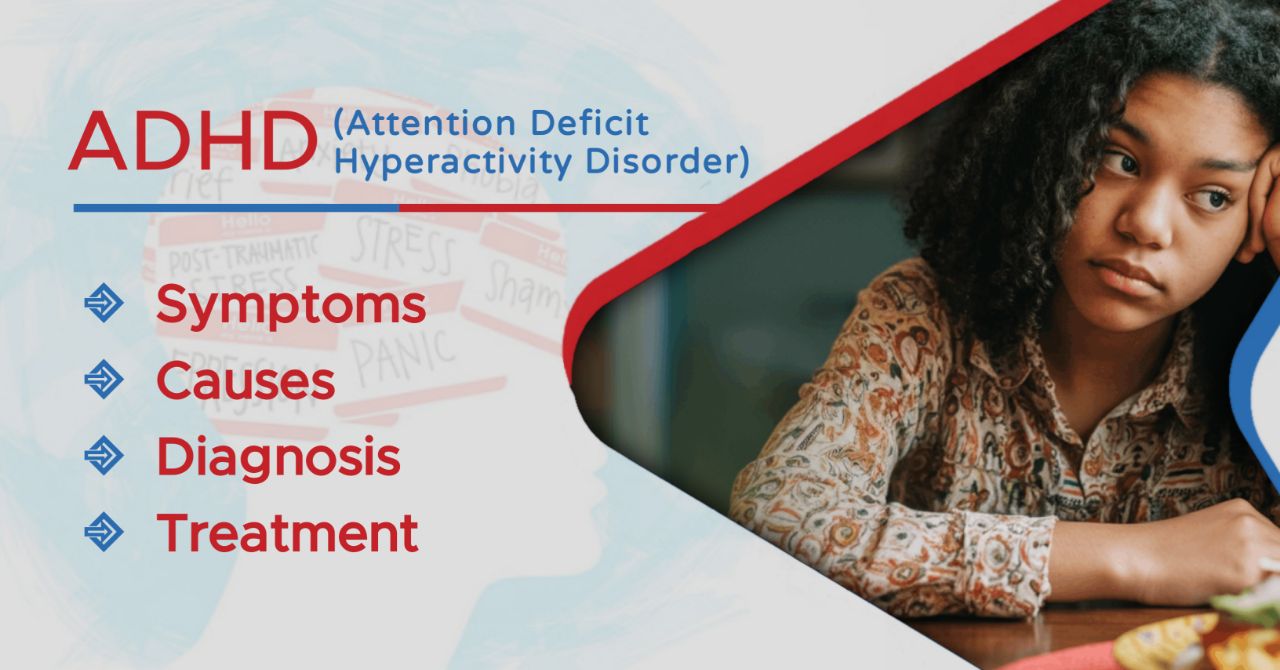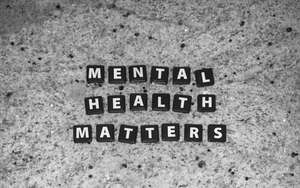
Attention Deficit Hyperactivity Disorder (ADHD)
Reading Time: 8min
What is ADHD?
Table of Contents
ADHD is a common neurodevelopmental disorder that affects both children and adults. It is characterized by a persistent pattern of inattention and/or hyperactivity-impulsivity that interferes with functioning or development.
It is important to understand that ADHD is not a result of laziness or poor discipline. It has biological origins that affect the brain's executive functions—the management system of the brain responsible for focus, impulse control, emotional regulation, and organization.
Core Symptoms and Presentation
ADHD symptoms are divided into two main categories. A diagnosis requires that several symptoms be present for at least 6 months and be inconsistent with the person's developmental level.
1. Inattention:
Fails to give close attention to details or makes careless mistakes.
Has difficulty sustaining attention in tasks or play activities.
Often seems not to listen when spoken to directly.
Does not follow through on instructions and fails to finish tasks.
Has difficulty organizing tasks and activities.
Avoids or is reluctant to engage in tasks that require sustained mental effort.
Often loses things necessary for tasks (e.g., keys, wallet, phone).
Is easily distracted by extraneous stimuli.
Is forgetful in daily activities.
2. Hyperactivity and Impulsivity:
Hyperactivity:
Fidgets with or taps hands and feet, or squirms in seat.
Leaves seat in situations where remaining seated is expected.
Runs about or climbs in inappropriate situations (in adults, often feelings of restlessness).
Unable to play or engage in leisure activities quietly.
Is often "on the go," acting as if "driven by a motor."
Talks excessively.
Impulsivity:
Blurts out answers before a question has been completed.
Has difficulty waiting their turn.
Interrupts or intrudes on others' conversations or games.
Types of ADHD
Based on the symptoms, a diagnosis will fall into one of three presentations:
Combined Presentation: If both inattention and hyperactivity-impulsivity criteria are met for the past 6 months.
Predominantly Inattentive Presentation: If the inattention criteria are met but hyperactivity-impulsivity criteria are not met for the past 6 months. (This was formerly known as ADD).
Predominantly Hyperactive-Impulsive Presentation: If the hyperactivity-impulsivity criteria are met but the inattention criteria are not met for the past 6 months.
Causes and Risk Factors
The exact cause is unknown, but research shows it is a complex interplay of:
Genetics: ADHD is highly heritable and often runs in families.
Brain Structure and Function: Differences in brain volume, development, and activity—particularly in the prefrontal cortex, which governs executive functions—have been observed. Key neurotransmitters like dopamine and norepinephrine are also involved.
Environmental Factors: Premature birth, low birth weight, and prenatal exposure to substances (e.g., alcohol, nicotine) may increase risk.
It is NOT caused by: Too much sugar, poor parenting, or excessive screen time, though these factors can sometimes exacerbate symptoms.
Diagnosis and Treatment
There is no single test for ADHD. Diagnosis is made by a qualified healthcare professional (like a pediatrician, psychiatrist, or psychologist) through a comprehensive evaluation, including interviews, symptom checklists, and gathering information from multiple sources (e.g., parents, teachers for children).
Effective management typically involves a multi-modal approach:
Therapy and Behavioral Interventions:
Cognitive Behavioral Therapy (CBT): Helps adults and older teens develop coping skills, manage negative thinking patterns, and improve organization.
Behavioral Therapy: For children, this involves parents and teachers using strategies to reinforce desired behaviors and reduce problematic ones.
Skills Training: Focuses on improving organizational, time-management, and planning skills.
Medication:
Stimulants: (e.g., Methylphenidate, Amphetamines) are the most common and effective type. They work by increasing brain chemicals like dopamine and norepinephrine, which help with attention and focus.
Non-Stimulants: (e.g., Atomoxetine, Guanfacine) may be used if stimulants are ineffective or cause side effects. They take longer to work but can also be very effective.
Lifestyle and Support:
Education: Learning about ADHD is the first step toward effective management.
Structure and Routine: Creating consistent daily routines can be immensely helpful.
Exercise and Nutrition: Regular physical activity and a balanced diet can help manage some symptoms.
Accommodations: At school or work, accommodations like extended time, a quiet space, or flexible deadlines can level the playing field.
ADHD in Adults
It is a myth that ADHD is only a childhood disorder. Symptoms often continue into adulthood. In adults, hyperactivity may present as extreme restlessness or an inner feeling of always being "on the go," while inattention may lead to significant challenges with:
Time management and punctuality
Organization and prioritization at work
Managing relationships and responsibilities
Emotional dysregulation and rejection sensitive dysphoria (RSD)
Myths vs. Facts
Myth: ADHD isn't a real medical disorder.
Fact: It is a clinically validated neurodevelopmental disorder with decades of research supporting its biological basis.
Myth: People with ADHD just need to try harder.
Fact: It is a problem of performance, not knowledge or effort. A person with ADHD may know what to do but be unable to do it consistently because of their brain wiring.
Myth: Only boys have ADHD.
Fact: While more commonly diagnosed in boys, girls and women are often underdiagnosed because they more frequently have the inattentive type, which is less disruptive.
Myth: If you can focus on video games or things you enjoy, you can't have ADHD.
Fact: People with ADHD often can hyperfocus on activities that are highly stimulating and rewarding, while struggling to focus on tasks that are not.
National and Organizational Resources
The Chiromo Hospital Group (CGHD)
Why it's important: This is one of the leading private mental health service providers in East Africa. They have a dedicated Child and Adolescent Mental Health Service which is the primary point of contact for diagnosing and managing ADHD in Kenya.
What they offer: Assessment, diagnosis, and treatment (including therapy and medication management) by qualified psychiatrists and psychologists.
Location: They have branches in Westlands (Nairobi) and Mlolongo.
How to find them: Search for "Chiromo Hospital Group" online. Their website provides contact details and services.
Aga Khan University Hospital, Nairobi
Why it's important: A major teaching and referral hospital with a Department of Psychiatry. They have specialists who can diagnose and manage ADHD in both children and adults.
What they offer: Comprehensive psychiatric evaluation and ongoing management.
Location: Nairobi.
How to find them: Visit the Aga Khan University Hospital website and look for the "Psychiatry" or "Mental Health" services section.
Kenyatta National Hospital (KNH)
Why it's important: As the largest public referral hospital, its Department of Mental Health provides services at a lower cost. This can be a vital resource for many families.
What to know: Wait times can be longer than in private facilities, but the care is provided by qualified professionals.
Location: Nairobi.
How to find them: You can visit in person or call the main switchboard to inquire about mental health services for children/adolescents.
The Kenya Association of Adolescent and Child Mental Health (KAACMH)
Why it's important: This is a professional body for experts in this field. While they don't provide direct public helplines, their members are the psychiatrists and psychologists working in clinics and hospitals like Chiromo and Aga Khan. Finding a professional who is a member of this association is a good indicator of specialization.
Finding a Specialist
The most direct path is to seek a consultation with a professional who specializes in ADHD. Look for:
Child and Adolescent Psychiatrists: Medical doctors who can diagnose ADHD and prescribe medication.
Clinical Psychologists: Professionals who can provide psychological testing, diagnosis, and therapy (e.g., CBT to build coping skills).
Educational Psychologists: Can assess learning challenges often associated with ADHD and advise on school accommodations.
How to Search:
Search online for terms like "Child psychiatrist Nairobi," "ADHD specialist Kenya," or "Educational psychologist Kenya."
When contacting a hospital or clinic (like those listed above), specifically ask for an appointment with a specialist in Child and Adolescent ADHD.
Community and Online Support
Formal support groups are less common, but online communities are invaluable.
Facebook Groups: Search for groups like "ADHD Kenya" or "Parents of Children with Special Needs Kenya." These are crucial for connecting with other parents and individuals to share experiences, recommendations for doctors, and strategies for managing school challenges.
Informal Networks: Connecting with other parents through school or these online groups can provide emotional support and practical advice that is specific to the Kenyan context.
Key Considerations for Kenya
Awareness and Stigma: There is still significant stigma and a lack of understanding about ADHD in Kenya. It is often mislabeled as "bad behavior" or laziness. Be prepared to educate those around you, including teachers.
School Advocacy: You may need to proactively meet with your child's teachers and school administration to explain ADHD and discuss possible accommodations (e.g., extra time on tests, a seating arrangement with fewer distractions).
Cost: Diagnosis and treatment in private facilities can be expensive. Explore options through your medical insurance and inquire about payment plans.
Medication Availability: Stimulant medications commonly used for ADHD (like Methylphenidate/Ritalin) are available in Kenya but may require a special license from the psychiatrist to be dispensed and can be costly.
Actionable First Steps in Kenya
Start with a Professional: Your first and most important step is to get a formal assessment. Contact Chiromo Hospital Group or the Aga Khan University Hospital to book an appointment with a child and adolescent psychiatrist.
Join an Online Community: Immediately search for and join a relevant Facebook group. The shared knowledge there is invaluable.
Educate Yourself: Use international resources like CHADD.org or ADDitudeMag.com to understand ADHD better, so you can be a strong advocate for yourself or your child.
Disclaimer: This information is a guide based on available public knowledge. Services and contact details may change. Always verify directly with the healthcare providers.
















